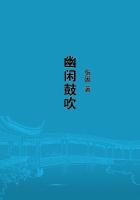Some considerable time must have gone by since any kind of courtesy ceased, in England, to be held necessary in the course of communication with a beggar. Feeling may be humane, and the interior act most gentle; there may be a tacit apology, and a profound misgiving unexpressed; a reluctance not only to refuse but to be arbiter; a dislike of the office; a regret, whether for the unequal distribution of social luck or for a purse left at home, equally sincere; howbeit custom exacts no word or sign, nothing whatever of intercourse. If a dog or a cat accosts you, or a calf in a field comes close to you with a candid infant face and breathing nostrils of investigation, or if any kind of animal comes to you on some obscure impulse of friendly approach, you acknowledge it. But the beggar to whom you give nothing expects no answer to a question, no recognition of his presence, not so much as the turn of your eyelid in his direction, and never a word to excuse you.
Nor does this blank behaviour seem savage to those who are used to nothing else. Yet it is somewhat more inhuman to refuse an answer to the beggar's remark than to leave a shop without "Good morning."
When complaint is made of the modern social manner--that it has no merit but what is negative, and that it is apt even to abstain from courtesy with more lack of grace than the abstinence absolutely requires--the habit of manner towards beggars is probably not so much as thought of. To the simply human eye, however, the prevalent manner towards beggars is a striking thing; it is significant of so much.
Obviously it is not easy to reply to begging except by the intelligible act of giving. We have not the ingenuous simplicity that marks the caste answering more or less to that of Vere de Vere, in Italy, for example. An elderly Italian lady on her slow way from her own ancient ancestral palazzo to the village, and accustomed to meet, empty-handed, a certain number of beggars, answers them by a retort which would be, literally translated, "Excuse me, dear; I, too, am a poor devil," and the last word she naturally puts into the feminine.
Moreover, the sentence is spoken in all the familiarity of the local dialect--a dialect that puts any two people at once upon equal terms as nothing else can do it. Would it were possible to present the phrase to English readers in all its own helpless good-humour. The excellent woman who uses it is practising no eccentricity thereby, and raises no smile. It is only in another climate, and amid other manners, that one cannot recall it without a smile. To a mind having a lively sense of contrast it is not a little pleasant to imagine an elderly lady of corresponding station in England replying so to importunities for alms; albeit we have nothing answering to the good fellowship of a broad patois used currently by rich and poor, and yet slightly grotesque in the case of all speakers--a dialect in which, for example, no sermon is ever preached, and in which no book is ever printed, except for fun; a dialect "familiar, but by no means vulgar." Besides, even if our Englishwoman could by any possibility bring herself to say to a mendicant, "Excuse me, dear; I, too, am a poor devil," she would still not have the opportunity of putting the last word punctually into the feminine, which does so complete the character of the sentence.
The phrase at the head of this paper is the far more graceful phrase of excuse customary in the courteous manners of Portugal. And everywhere in the South, where an almost well-dressed old woman, who suddenly begins to beg from you when you least expected it, calls you "my daughter," you can hardly reply without kindness. Where the tourist is thoroughly well known, doubtless the company of beggars are used to savage manners in the rich; but about the byways and remoter places there must still be some dismay at the anger, the silence, the indignation, and the inexpensive haughtiness wherewith the opportunity of alms-giving is received by travellers.















